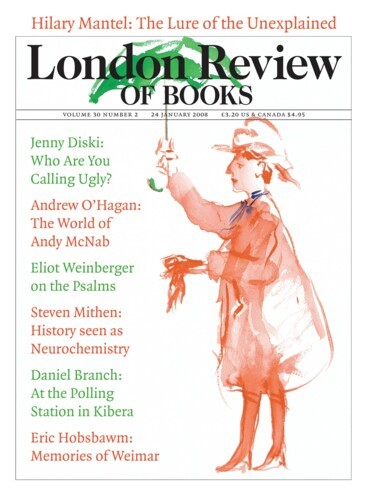Books and blogs, if they’re doing their jobs properly, are as different as two kinds of published text can be. For one thing, creating a book takes many months, not to say years, and the process requires the participation of a whole chain of people besides the writer: commissioning editors, copy-editors, typesetters, proofreaders, printers, distributors, booksellers etc. A blogger can have an unedited post up on the web and available to readers within minutes of the idea popping into his head. A blog is non-linear, always unfinished, ever open. It can be indefinitely added to, rewritten, cut from, commented on. But more than that, a blog should be dense with hyperlinks, sending the reader off into the blogosphere and the rest of the internet along a chain of endlessly forking paths. That may well sound like your idea of a nightmare, which is just one of the many reasons the internet isn’t going to make books obsolete anytime soon.
Publishing an anthology of blogs in book form, then, would appear to make about as much sense as broadcasting Singin’ in the Rain on the wireless: you’d still get to hear Donald O’Connor singing ‘Make ’em Laugh’, but it’s not quite the same if you can’t see him walking along the piano keys, dancing with the headless dummy and running up the walls. But that hasn’t stopped Sarah Boxer, a former New York Times reporter, from putting together a collection called Ultimate Blogs: Masterworks from the Wild Web (Vintage, $14.95) – on the face of it, an early contender for most pointless book of the year.
Boxer isn’t unaware of the potential contradictions in her project: ‘The thing you are now holding in your hand is a book, not a computer,’ she writes. No arguing with that. ‘You cannot click on a link in a printed book. And a book looks weird when its pages are littered with website addresses and very long quotes and quotes within quotes. So, no links here, folks.’ She also says she hasn’t included any blogs about gadgets, sport, gossip or politics (though, in fact, she has), because ‘their posts get stale.’ ‘Where then,’ she asks, ‘does that leave an anthology of blogs?’ Where indeed? ‘If the blogs in here were not going to be timely . . . they had better well be timeless, and if they were not going to be linky, they had better well be self-contained.’
In other words, for an anthology of blogs to work, the blogs it contains have to be as unbloglike – as booklike – as possible. Boxer retreats behind an argument about style: all the pieces she’s chosen are ‘distinctly bloggy’, by which she means ‘conversational and reckless, composed on the fly for anonymous intimates’. And they are, on the whole, a diverting enough bunch. The best of the lot, though, is the diary of Samuel Pepys, which a web designer called Phil Gyford has been posting in daily instalments since 2003, using the text already online at Project Gutenberg. It doesn’t exactly not fit in here, which rather puts paid to the whole idea that there’s something ‘distinctly bloggy’ about the style of blogs.
Andrew Keen, however, would not be so sanguine. The founder of an internet start-up in the late 1990s that didn’t make him a millionaire, Keen is now a self-declared apostate. In The Cult of the Amateur: How Today’s Internet Is Killing Our Culture and Assaulting Our Economy (Nicholas Brealey, £12.99), Keen argues that websites such as YouTube, MySpace and Wikipedia are killing someone or other’s culture and assaulting their economy. As is so often the case with conservative polemic, Keen takes it for granted that he and his readers know who ‘we’ are. Keen’s worry, essentially, is that hundreds of millions of talentless know-nothings are so busy uploading videos of themselves falling over or writing spurious and inaccurate Wikipedia entries that they have neither the time nor the inclination to spend money on CDs or newspapers. ‘Amateur hour has arrived,’ he announces, ‘and the audience is now running the show.’
His damascene conversion took place during a camping trip in September 2004 with a couple of hundred other Silicon Valley insiders. Nauseated by the orgy of self-congratulation (I’ve no doubt the occasion was at least as ghastly as he makes it sound), Keen fled in horror. He had thought the internet was about ‘using technology to bring more culture to the masses’, but the cry on the lips of the other happy campers was ‘democratisation’: the future of the web lay in user-generated content. Keen is right that most of this stuff is a load of crap, but he seems to have been taken in by the hype that he’s so repelled by. Yes, the web is full of rubbish uploaded by anyone and everyone. But 99.999 per cent of it is completely ignored by everyone else. A home video is still just a home video, and a teenager’s diary is still just a teenager’s diary, whether it’s collecting dust in a desk drawer or stored on a server farm somewhere in Arizona. Meanwhile, Singin’ in the Rain is available on DVD from Amazon for a fiver, and will almost certainly soon be downloadable from iTunes for a similar price. Keen ought not to be so concerned: I’m sure the behemoths of entertainment capitalism will find a way to muddle through.
Send Letters To:
The Editor
London Review of Books,
28 Little Russell Street
London, WC1A 2HN
letters@lrb.co.uk
Please include name, address, and a telephone number.

